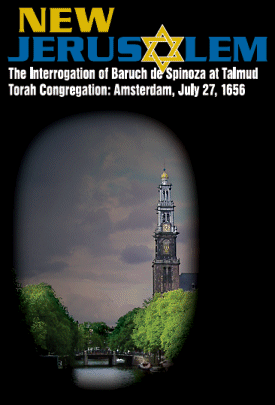 BY BRANDON LAFVING As the name suggests,Lantern Theater Company’s New Jerusalem, The Interrogation of Baruch de Spinoza at Talmud Torah Congregation: Amsterdam, July 27, 1656, transports the audience to a 17th Century trial setting. You might also be able to guess that Spinoza, a rationalist philosopher, is both the protagonist and the defendant. And you may also know how it ends: he will be excommunicated. Sorry if I ruined that for you, but, honestly, a good friend would have done their job and told you. It only makes the play more interesting.
BY BRANDON LAFVING As the name suggests,Lantern Theater Company’s New Jerusalem, The Interrogation of Baruch de Spinoza at Talmud Torah Congregation: Amsterdam, July 27, 1656, transports the audience to a 17th Century trial setting. You might also be able to guess that Spinoza, a rationalist philosopher, is both the protagonist and the defendant. And you may also know how it ends: he will be excommunicated. Sorry if I ruined that for you, but, honestly, a good friend would have done their job and told you. It only makes the play more interesting.
Lantern’s rendition of this dramatic David Ives screenplay may exemplify historical fiction – a genre popularized by the History Channel – but it pushes well beyond that salt-petered soil. The major source of intrigue for the play lies in whether the philosopher is guilty or should be acquitted. Along the way, the audience is coaxed through the main premises of rationalism, some of which are flagrant heresy to the Jewish faith, some of which have been heard by some of history’s most persuasive spiritual leaders.
The screenplay is a case-and-point for why artists should explore outside their most familiar genre. Playwright David Ives is more typically a comedian, which vents the intensity by rolling out great, belly romps of much-needed relief. When Spinoza is accused of being a Christian, a serious offense for a Jew to harbor, the philosopher replies on one note above matter-of-fact, “After the elegant absurdity of being born a Jew, why would I accept the mere illogic of Christianity?” Touché, indeed.
Spinoza, played by Sam Henderson as an inspired boy-genius, does not appear to recognize the threat of excommunication. Wearing a rakishly puffy black jacket with strips of leather running down the sleeves and silver buttons, the poet-philosopher enters extolling the beauty of Amsterdam. When cautioned about the Jewish community’s reaction to his ideas’ unorthodoxy, Baruch impishly ventures, “There is no Jewish dogma, only bickering.” Henderson inhabited his role well, selling me with his brazen, half-crazed, unsymmetrical smile, which he used to ornament his character’s deep intelligence.
But where Henderson had me interested and entertained, David Bardeen, playing the Rabbi Saul Levi Mortera, held me captive. Easily the most tormented character of the play, the Rabbi is faced with the choice of banishing his most prized and loved pupil, Spinoza. Dressed in a full length robe with the sleeves rolled back to expose a lush, silk burgundy lining, Bardeen needed no flourishes of youthful exuberance to draw attention. He often stood with his hands held loosely in front of him, a poise that the actor gave natural grace. Intelligence and control emanated from his person – a perfect balance to Spinoza’s wild rants.
Lantern reaches far with this piece, which is extremely demanding on its cast. The acting did not always hold up to the challenge, but it was an apt vehicle for a cuttingly brilliant screenplay. The play’s run has been extended by six performances due to popular demand. This historical fiction explores cultural tolerance, censure, love, and Spinoza’s most compelling ideas. The drama is so tightly packed, you could bounce a dime off it.
